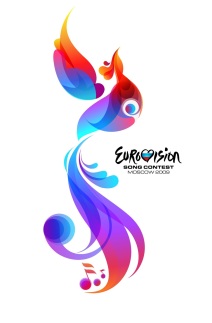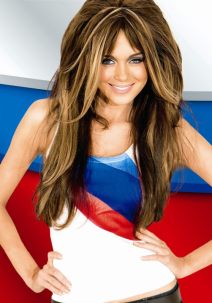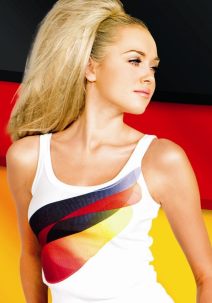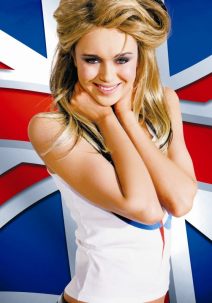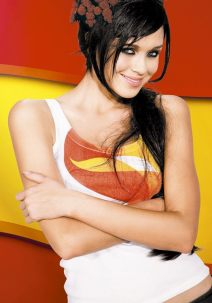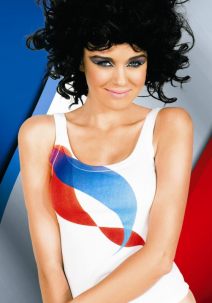Eurovision Song Contest 2009 in Moscow, Russia
The Eurovision Song Contest 2009 took place in Moscow, the capital of the Russian Federation, on May 12th, 14th and 16th 2009. It was the first contest ever hosted in Russia. So the Russians didn't save money and effort to impress the world with a great show. The Eurovision Song Contest 2009 in Moscow was an amazing and exciting spectacle setting new standards which would be hard to top. For Russia, the organisation of the international Song Contest was also a rehearsal for the Olympic Winter Games 2014 in Sochi.
In 2008, the Russian singer Dima Bilan won the Grand Final in Belgrade with his song Believe and made Moscow the host-city of the Eurovision Song Contest 2009.
On December 10, 2008 the official delegation from Belgrade handed the symbolic keys of the Eurovision Song Contest over to Moscow. The special ceremony took place in the State Department Store GUM at the Red Square.
Anastasia Prichodko - a young Ukrainian singer with a deep voice - was chosen to represent Russia at the Eurovision 2009. The song is called "Mamo".
| Host Country: | Russia (the Russian Federation) Travelers to the Eurovision Song Contest in Russia required a visa |
| Host City: | Moscow |
| Venue: | The Olimpiysky Indoor Arena (Russian: Спорткомплекс "Олимпийский", literal translation: Sport Complex "Olimpiysky") The Olimpiysky Arena was built in 1980 especially for the Sommer Olympic Games in Moscow. The Arena is situated in the centre of Moscow, at the Metro-Station "Prospect Mira". An international designer team is working on stage design for the European Song Contest. |
| Host Broadcaster: | Channel One (Russia / Russian: "Первый канал") |
| Official logo: | a red-blue firebird from the Russian folklore (Russian: "жар-птица" [schar-ptíza]) |
| Number of participants: | 42 countries |
| Final results of the Grand Final: |
|
| Ticket Prices: | Tickets cost from 800 up to 20000 rubles (about 17-445 euros) for both Semi-Finals. Tickets for the Grand Final were a bit more expensive and cost from 1 000 up to 30 000 rubles (about 22-667 euros). The VIP-Card "The Golden Package" provided access to the backstage area, different events and to the restaurant. It cost 350 000 rubles (about 7 778 euros) and was valid for both Semi-Finals and the Grand Final. |
| The financials: | About one billion rubles provided by the Russian Federation (about 22 Mio 223 thousand euros), 3 million rubles (about 67 thousand euros) provided by Moscow Government and 5 million Swiss francs (about 3 millions 283 thousand euro) provided by the European Broadcasting Union (EBU). |
| Current exchange rate for Russian rubles in euros and U.S.-dollars (USD) | |
| Advertising in Moscow: | 5 500 posters, dozens of over the street banners, about 1 200 extra big billboards. |
Video: Eurovision 2009 Stage Design
Miss World 2008 welcomed the participants of the Eurovision Song Contest in Moscow
Billboards all over Moscow promoted the 42 countries participating in the Eurovision Song Contest 2009. Each billboard showed the national flag and a girl looking like a representative of the respective Eurovision country. Surprisingly, one and the same Russian girl personified all 42 beauties. It was Miss World 2008 Ksenia Sukhinova (Russian: Ксения Сухинова).
- Miss World as Russia © Channel One Russia
- Miss World as Germany © Channel One Russia
- Miss World as Great Britain © Channel One Russia
- Miss World as Spain © Channel One Russia
- Miss World as France © Channel One Russia
Hosts of the Eurovision Song Contest 2009 in Moscow
The names of the hosts of the Eurovision Contest were kept secret for a long time. On May 7th the General Director of the Russian host broadcaster "Channel One" finally announced the names of the four presenters.
Hosts of the First and Second Semi-Finals
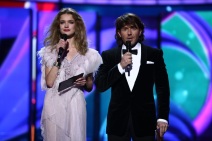
Natalia Vodianova and Andrei Malakhov at the 1st Semi-Final of Eurovision 2009. Photo © Indrek Galetin (EBU)
Natalia Vodyanova (Russian: Наталья Водянова)
At the age of 16 Natalia was discovered by a model agency in her hometown Nizhny Novgorod. She became one of the worlds' most successful top models. Natalia war starring in advertising campaigns for Calvin Klein, Louis Vuitton and L'Oreal. Natalia Vodyanova lives with her husband Justin Portman and their three children in New York.
Andrey Malakhov (Russian: Андрей Малахов)
Andrey is a famous TV journalist and presenter in Russia. He also enjoys the image of being one of the most stylish men at the Russian TV. Since 1996 he works for the Channel One Russia as a special correspondent and host of different talk and music shows. Currently Andrey presents the popular talk-show "Let them talk" (Russian: "Пусть говорят").
Hosts of the Grand Final
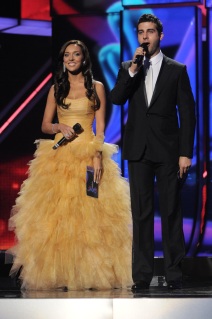
Alsou and Ivan Urgant at the the Final of the Eurovision 2009. Photo © Indrek Galetin (EBU), Alain Douit (EBU)
Alsou (Russian: Алсу)
Alsou is a popular singer in Russia. She represented Russia at the Eurovision Song Contest 2000 with her song "Solo" and took the second place. Now she is one of the most successful pop-singers in Russia. Alsou also worked with international stars like Enrique Iglesias, John Bon Jovi and Nelly.
Ivan Urgant (Russian: Иван Ургант)
Ivan comes from St Petersburg and is a son of famous actors. He worked for different radio and TV stations in St. Petersburg. Currently he works for "Channel One Russia". Ivan hosts different TV shows including a culinary show "Smak" (Russian: "Смак"), "The Magic World of Walt Disney" (Russian: "Волшебный мир Уолта Диснея"), "Projectorparishilton" (Russian: "Прожекторперисхилтон") and others.
Shows of the Eurovision Song Contest 2009
First Semi-Final: 12th of May, 2009. From 21.00 to approximately 23.00 CET (Moscow time: CET+2)
Participants in the first Semi-Final: 18 countries. Montenegro, Czech, Republic Belgium, Belarus, Sweden, Armenia, Andorra, Switzerland, Turkey, Israel, Bulgaria, Iceland, F.Y.R. Macedonia, Romania, Finland, Portugal, Malta, Bosnia & Herzegovina.
Second Semi-Final: 14th of May, 2009. From 21.00 to approximately 23.00 CET (Moscow time: CET+2)
Participants in the second Semi-Final: 19 countries. Croatia, Ireland, Latvia, Serbia, Poland, Norway, Cyprus, Slovakia, Denmark, Slovenia, Hungary, Azerbaijan, Greece, Lithuania, Moldova, Albania, Ukraine, Estonia, The Netherlands.
The Grand Final: 16th of May, 2009. From 21.00 to 00.15 CET (Moscow time: CET+2)
Participants in the Grand Final: five countries have guaranteed places in the Grand Final: Russia (the Host Country), France, Germany, Spain and the United Kingdom (as major members of the European Broadcasting Union (EBU)). Ten countries shall qualify for the Grand Final in each Semi-Final. 25 countries will compete in the Grand Final in total.
Results of the Eurovision Song Contest 2009
Alexander Rybak from Norway, the winner of the European Song Contest 2009, also broke records collecting the highest number of points in the Eurovision history. His song "Fairytale" received 387 points altogether. 16 countries chose Alexander as their favourite giving him 12 points: Russia, Belarus, Germany, Holland, Sweden, Denmark, Spain, Island, Israel, Lithuania, Latvia, Estonia, Ukraine, Poland, Slovenia and Hungary.
The second place at the Eurovision Song Contest in Moscow took Yohanna from Iceland with the song "Is It True?" (218 points). AySel & Arash from Azerbaijan with the song "Always" came third (207 points). Anastasia Prichodko, who was singing the song "Mamo" for Russia, ended in 11th position (91 points).
Video: Alexander Rybak at the Eurovision Song Contest 2009
About Alexander Rybak, the Winner of the Eurovision Song Contest 2009
The charming fairytale prince from Norway originally comes from Belarus. Alexander Rybak is fluent in Russian. He had to prove his good knowledge of the Russian language in numerous interviews to Russian journalists in Moscow. "Please speak to me as if I were an 8-year old kid", - asked Alexander the Russian journalists. After speaking Norwegian on stage, Alexander said in Russian "Спасибо вам большое! Вы самая лучшая публика в мире!" ("Thank you very much! You are the best audience in the world!") (Watch video on top of the right column.)
Alexander Rybak was born in Minsk (Belarus) on the 13th of May, 1986 into a family of musicians. His family name means "fisher" (in Russian: Рыбак). At the age of five Alexander started playing violin and piano. He also composes his own songs. Alexander Rybak grew up in Nesodden, near Oslo. In 2006 he won the Norwegian talent show Kjempesjansen with his own song Foolin’. Alexander Rybak already worked with world-famous artists like Morten Harket, the frontman of the pop-band a-ha. Rybak's debut album "Fairytales" is to be released soon (in Germany in May 2009.) Alexander also plans a concert tour to Eurovision countries. Alexander Rybak's self-composed song "Fairytale" is already a big download hit on the internet. Soon after the Grand Final it hit the iTunes Single Top-10 in several countries.
Short Recap of all the Songs of the Grand Final of the Eurovision Song Contest 2009
Related Articles
Russia at the Eurovision Song Contest: Overview
Russian radio online: listen, enjoy and improve your Russian
